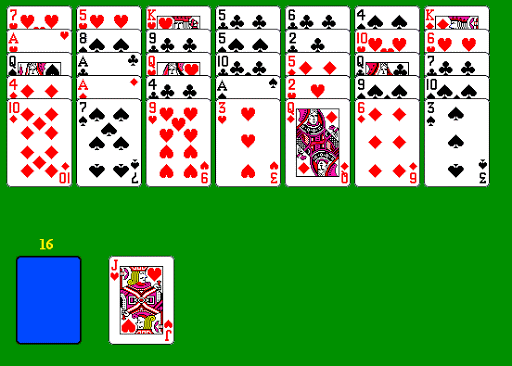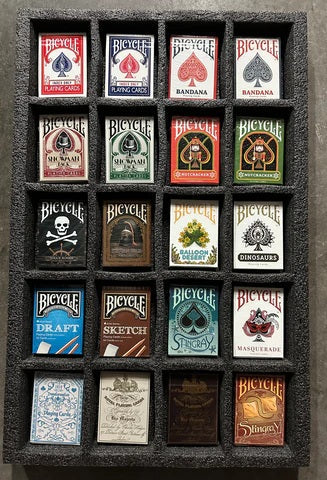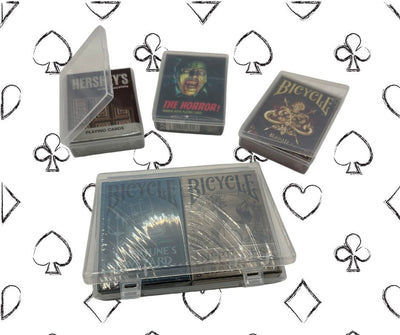Playing solitaire with a traditional deck of playing cards is a pastime that goes back a couple of hundred years. But the birth of the personal computer injected new life into these classic games, and the digital revolution has helped bring solitaire card games to a whole new audience. Chiefly responsible for this development is software giant Microsoft, who began including versions of solitaire along with their Windows operating system in the early 1990s, much to the relief of bored office-workers around the world.
But not all solitaire card games are created equal. To begin with, this is a very large family of games, and its family members aren't all kissing cousins that are merely small variations of the same thing. While many solitaire games do share much in common, there's also a surprising amount of differences between some of them. They can offer very different challenges, some of which require real skill, strategic placement, and careful card counting, while others can be played almost on auto-pilot in a very chilled and relaxed frame of mind. Whether or not you can complete them in some cases just comes down to stupid and pure luck, but there are many excellent solitaire games that take real skill to play well, and will prove to be a rewarding and satisfying experience to come back to often.
So what are some of the top solitaire games you really should know about? I've done some scouring around to try to figure out what solitaire games have proven most popular, to help you get started with the very best, rather than waste time with mediocre or less-than-satisfying games. As I covered in a previous article, the three most played solitaire card games in the world are Klondike, Spider, and FreeCell, courtesy of their inclusion in Microsoft's solitaire software. But following closely on their heels are two other favourites: Pyramid and Golf. Even today versions of these two solitaire games are included in Microsoft's digital collection of five solitaire games along with the holy trinity of Klondike, Spider, and FreeCell, and it's one reason why they are so well-known.
But another reason for the popularity of Pyramid and Golf is their simplicity. They are widely considered to fall into the category of matching games, or adding and pairing games. Typically, solitaire card games in this family have the objective of matching two cards, either by pairing ones of the same rank (e.g. two Aces) or adjacent ranks (e.g. an Ace and a Two), or by adding two cards together to reach a certain value. It's a common genre, and some of the most popular solitaire card games of all time are among them, including the two included in Microsoft's standard base suite of five solitaire games: Pyramid, and a variation of Golf called Tri-Peaks. Games of this sort have typically less complicated rules than builder-type solitaire games, making them an ideal starting point for children and first-timers.
NB: You can play these games on many websites, but I've chosen to use Solitaired, simply because it's free and easy, so the accompanying screenshots below are of games I've played on their site.
Pyramid
Overview: The name of Pyramid gets its name for the triangular shape in which the cards are dealt at the start of the game. Pyramid hit the big time when Microsoft started including it (and another solitaire game called Tri-Peaks) in their Microsoft Solitaire Collection in 2012, which is when they added it to the existing trilogy of Klondike, Spider, and FreeCell already included in previous versions of Windows. An earlier variation of Pyramid under the name Tut's Tomb had already been included in Microsoft Entertainment Pack 2 that was released in 1991, so Pyramid has been on many personal computers almost as long as Klondike.Game-play: This game is a classic example of the "adding-and-pairing" genre of solitaire card games. You deal 28 face-up cards in an overlapping fashion to create a pyramid, starting with a row of one, then a row of two, and so on until a row of seven cards. With Jacks counting as 11, Queens as 12, and Kings as 13, any two available and unblocked cards can be removed if their combined value adds up to 13. Cards are turned up from the stock one at a time, and may be used as part of these pairs. You win if you clear the entire pyramid.
Variations: There are many common variations on Pyramid, many to make the game easier, such as by allowing multiple passes through the stock, or by dealing the final row of 7 cards as a separate reserve that's available throughout the game. Less common variations that simplify game-play include adding a free storage cell, allowing a card to make a pair with the one immediately underneath it, or by keeping the top-card of the stock pile face-up at all times. In Apophis, three waste piles are used instead of just one. To make the game harder, some variations also require all the cards in the stock to be removed before counting the game as a win, and removing this requirement is described as "Relaxed Pyramid". In King Tut (which corresponds to Microsoft's "Tut's Tomb") you deal the stock in sets of three, which also makes for a harder game, even though it allows unlimited deals.
My thoughts: Pyramid is an excellent game that can help children learn basic addition, and playing this game is one way to make them quickly become comfortable with all the pairs that add up to 13. It's also a relaxing game for adults, who are looking for something that involves easy decisions and yet remains satisfying. The odds of clearing the pyramid in a single deal of the stock are only around 1 in 50, so you are often dependent on the luck of the draw. This is why some variations give you access to more cards, by adding a reserve, extra waste piles, or enabling you to redeal more times; these typically are more rewarding and less frustrating to play.
Related games: In Giza, a creation of Michael Keller, the entire stock is dealt face-up into a tableau of three rows of seven cards that are available as a reserve from the outset. This reduces the luck and increases your chances of a win by making it an open game. Thomas Warfield created Double Pyramid, which is essentially the same game as Pyramid, but uses two decks, and starts by adding two extra rows to the initial tableau, so that the final row consists of 9 cards. Alternatively, in Pharaohs you deal three pyramids. There are also games like Triangle, which invert the Pyramid for a much harder game.
Golf
Overview: If you're skeptical about your ability with solitaire card games, you should at the very least try Golf, which commends itself because of its simplicity and speed. The game owes its name to the sport, and each deal can be treated like a golf hole. The aim is to remove all the cards of the tableau, and every card remaining counts as a stroke, with a par of four cards per hole. You can play nine consecutive holes, if you wish, keeping a running score and with the goal of trying to get a par score of 36.Game-play: Begin with a tableau of seven columns, each consisting of four overlapping cards, all face-up and visible, while the remaining cards form a stock. The first card is dealt face-up, and any available card that is one rank higher or lower than it can be removed, with suits being ignored. You continue to remove cards in this way, proceeding either up or downwards, ignoring suits, until you can't remove any more cards, at which point you deal the next card from the stock and repeat the process. You win the game if you successfully remove the complete tableau in a single deal of the stock.
Variations: Officially a game of Golf doesn't allow you to "wrap", by turning around the corner from Ace to King. In fact, under the strictest rules removing a King ends a running sequence, although you can continue a sequence from an Ace by playing a 2. Common variations (e.g. Putt Putt) adjust these rules to allow Aces and Kings to be removed in sequence, which increases your options and enhances your chances of a successful game significantly. Even allowing Queens to be played on Kings helps prevent you from becoming stuck too easily.
My thoughts: Due to the simple rules and game-play, you can often speed through an entire game of Golf in as little as a minute or two, and that makes it an ideal low-stress filler. The ease of game-play also makes it very accessible for first-time players. There's definitely some luck of the draw that plays a role, but the fact that the entire tableau is face up means that you can look ahead at your options and plan the optimal series of moves, so it's not entirely without strategic choices. Whenever there is a fork in the road of decision, a good sense of probability can help you make the right move.
Related games: The basic game-play of Golf lends itself well to many variations, simply by changing the initial set-up, while preserving the concept of play. Golf Rush uses the same rules but starts with a Klondike style arrangement of cards. In Pyramid Golf, also called Escalator, a starting arrangement borrowed from Pyramid is used; also similar is Cheops. Two others which apply the same concept to different starting set-ups include Black Hole and Eliminator. For a real-time two-player game in the style of Golf, take a look at Spit.
Tri-Peaks: By far the most popular game inspired by Golf is called Tri-Peaks, which owes its success largely due to the fact that it was included in the solitaire set of games that comes with Microsoft Windows. This has a starting arrangement of three adjacent pyramids (hence the name) of six cards each, and a lower row of ten cards. It was created by Robert Hogue in 1989, and his own statistical analysis of his game suggests that the vast majority of games are solvable. While it's much easier to solve than usual Golf, some will also find it less interesting due there being less decisions.
Multiplayer Golf: Many books suggest playing Golf competitively, by each playing a "hole" simultaneously, and cumulatively keeping track of your scores, just like a round of the actual sport. There are even ways of playing head-to-head match-play, or a four player game in partnerships, where each player has their own deck and the team score uses the lowest achieved by each pair.
Conclusion
Many other fine matching games that require pairing or adding cards exist, some of which I've already mentioned above under variations and related games. If you enjoy games of this sort, some others you should take a look at include Nestor, The Wish, Monte Carlo, and Beehive.While the Microsoft Solitaire Collection deserves a lot of credit for popularizing Pyramid and the Golf-inspired Tri-Peaks, the reality is that these entry-level solitaire games were already popular, and have been favourites for a long time. They don't burn much brain-power, making them ideal companions for a relaxing hour on the couch, or to while away time when there's some spare moments to kill. Even children can enjoy playing them, so they are an ideal place to start if you've not had much experience playing solitaire before.
But be warned: even these simpler solitaire games can prove quite addictive!
Where to play them? Head to Solitaired and try a game of Pyramid or Golf right now!
About the writer: EndersGame is a well-known and respected reviewer of board games and playing cards. He loves card games, card magic, cardistry, and card collecting, and has reviewed several hundred boardgames and hundreds of different decks of playing cards. You can see a complete list of his game reviews here, and his playing card reviews here. He is considered an authority on playing cards and has written extensively about their design, history, and function, and has many contacts within the playing card and board game industries. You can view his previous articles about playing cards here. In his spare time he also volunteers with local youth to teach them the art of cardistry and card magic.





